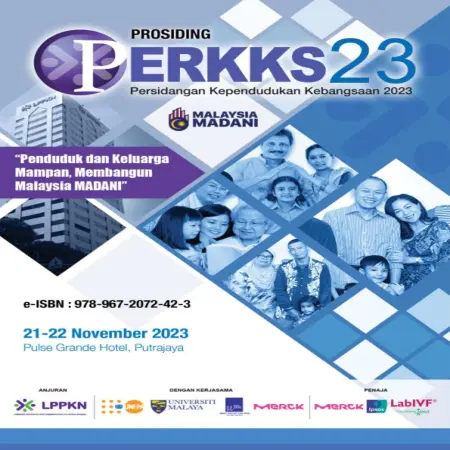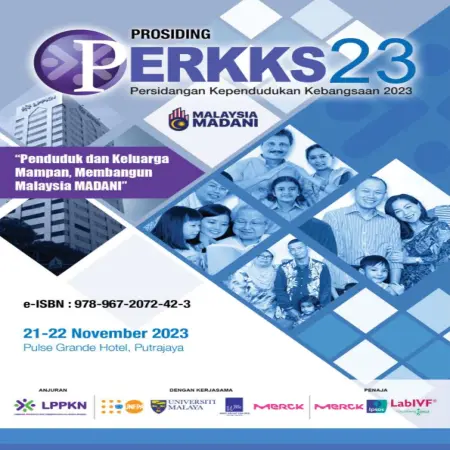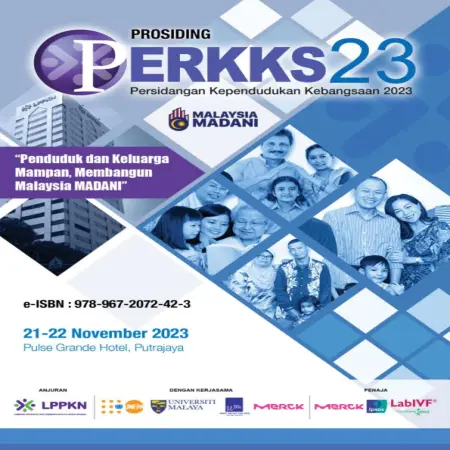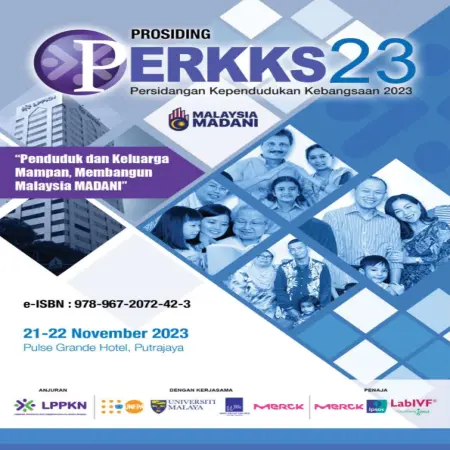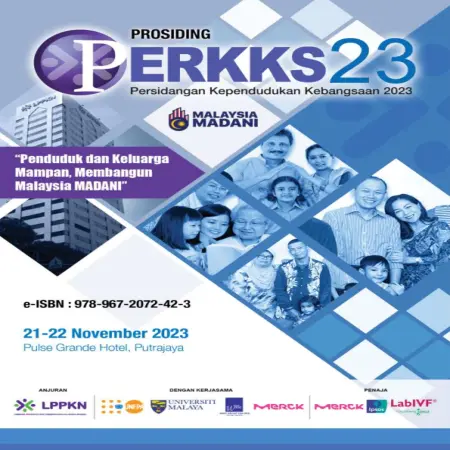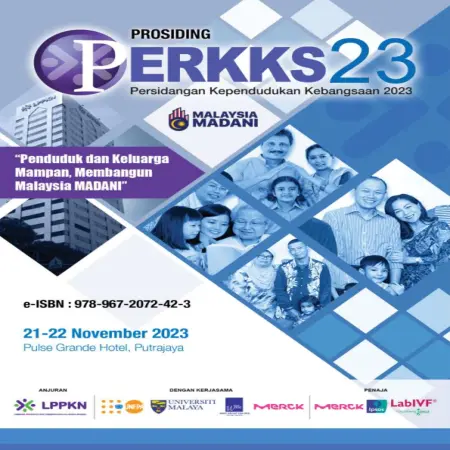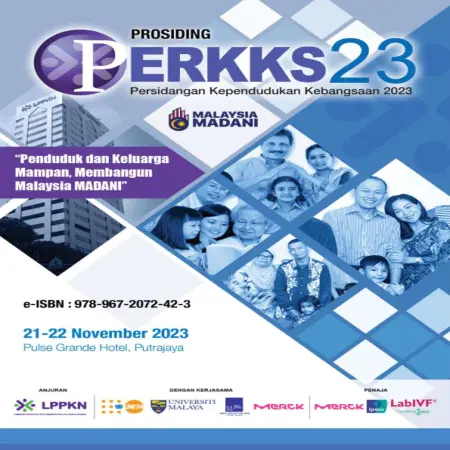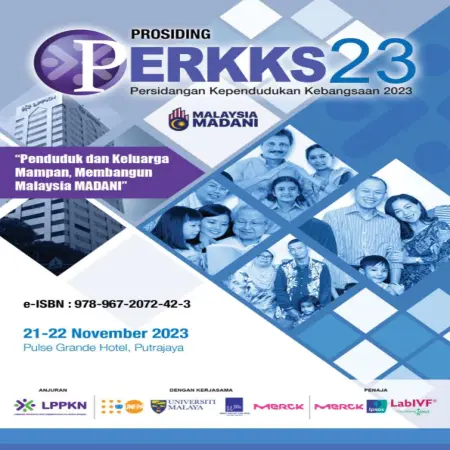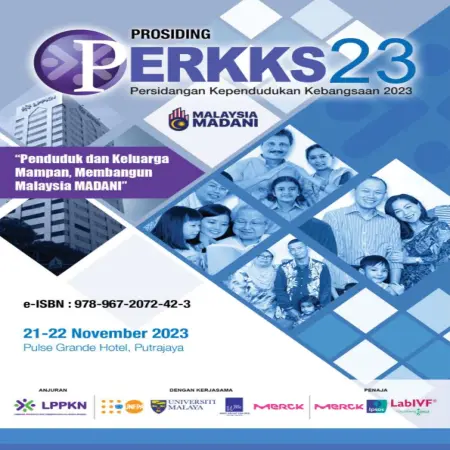Browse by Type
Results for Item type : "Book Section"
|
|
Faktor kritikal mendepani isu dan cabaran tenaga kerja menua
Item Type: Book Section
Editor:
Year: 00/12/2023
Abstract: An aging workforce is one of the few phenomena faced by countries experiencing an aging population. This is also the case in Malaysia which has been categorized as an aging country by the World Bank since 2020. The aging workforce poses a number of issues and challenges to policy makers, employers and employees, especially those who are going through the aging process themselves.
|
|
|
|
|
|
Perceived social support, mental health and quality of life among recipients of old age financial assistence
Item Type: Book Section
Editor:
Year: 00/12/2023
Abstract: The present study examines multidimensional perceived social support, mental health and quality of life (QOL) in older adults aged 60 years and older who receive the financial assistance provided by the Department of Social Welfare. A cross-sectional study approach was conducted among 487 older adults living in Selangor, Malaysia, who are the recipients of old age financial assistance known as Bantuan Warga Emas (BWE).
|
|
|
|
|
|
Kesan peralihan demografi terhadap kebajikan sosial dan pasaran buruh: perbincangan kumpulan fokus
Item Type: Book Section
Editor:
Year: 00/12/2023
Abstract: Demographic transition refers to changes in the population structure of a country, mainly related to factors such as birth rate, mortality rate and life expectancy of the population. This study aims to identify the effects of demographic transition on social welfare and labour market conducted in Shah Alam, Selangor among heads of household.
|
|
|
|
|
|
The Evolution of a Progressively Graying Staff: A Bibliometric Analysis
Item Type: Book Section
Editor:
Year: 00/12/2023
Abstract: The development of research on demographic and related aspects of the ageing workforce is crucial to resolve the labour shortage issue and the increase in retirement age.
|
|
|
|
|
|
The linkage of government assistance programs towards digital and financial well-being of small household income families in urban area during covid-19 pandemic
Item Type: Book Section
Editor:
Year: 00/12/2023
Abstract: The Covid-19 pandemic and the Movement Control Order (MCO) have had a negative impact on the financial well-being and digital well-being of B40 or small household income families in urban areas. In responding to the crisis, the government had launched multiple assistance programs to assist the group. Hence, the study intends to examine the relationship of government assistance towards digital and financial well-being of the group.
|
|
|
|
|
|
Emosi dan kesihatan mental ibu bapa di fasa endemik covid-19: hasil penemuan kajian tinjauan pendapat umum LPPKN di Negeri Terengganu
Item Type: Book Section
Editor:
Year: 00/12/2023
Abstract: Post Covid-19 had an impact on family institutions mainly in terms of preparation of family members especially parents in facing life post-pandemic Covid-19. This study aimed to identify the emotional and mental health levels of parents in the endemic phase of Covid-19 in Terengganu.
|
|
|
|
|
|
Women in Malaysian Animation Films: Characters and Roles
Item Type: Book Section
Editor:
Year: 00/12/2023
Abstract: The area of animation is currently seeing significant growth and development in Southeast Asia, with particular emphasis on the nation of Malaysia. At this point, Malaysia has demonstrated a notable proficiency in the creation of animated films of superior quality and substantial scope. Animations have emerged as a significant component in the advancement of display media during the Fourth Industrial Revolution (IR 4.0). These animations serve as a medium that indirectly facilitates the process of teaching and learning.
|
|
|
|
|
|
Understanding the relationship between digital parenting styles and children’s digital resilience in Malaysia
Item Type: Book Section
Editor:
Year: 00/12/2023
Abstract: The significant increase in online and screen time adds to the issues of children's online safety which has always posed a significant risk to parents, even before the pandemic. The opportunity given by parents to access digital gadgets has transformed how children perceive, react, and adapt to world change, especially in the era of IR4.0. Despite a huge number of studies conducted on digital media among young generations, only a few focused on digital parenting and digital resilience topics, especially in the aftermath of the COVID-19 pandemic.
|
|
|
|
|
|
Analisis literatur menangani isu keganasan rumah tangga demi membangun Malaysia Madani
Item Type: Book Section
Editor:
Year: 00/12/2023
Abstract: Domestic violence is one of the branches of the discussion of family counseling issues among counselors in Malaysia. Domestic violence is a social problem that has adverse effects on women and children from physical, psychological and social aspects. This study was conducted to detail the findings of a semi-structured interview with an Information Officer of the Nur Sejahtera Clinic of the National Population and Family Development Board (NPFDB) and an Assistant Officer of the Jabatan Kebajikan Masyarakat Malaysia (JKMM) as well as a literature review related to definitions, propositions / Nas Al-Quran, factors , elements of legislation, intervention, Islamic approach, and measures to overcome the issue of domestic violence.
|
|
|
|
|
|
Kemiskinan haid: analisis pengetahuan, sikap dan amalan pengurusan menstruasi di Malaysia
Item Type: Book Section
Editor:
Year: 00/12/2023
Abstract: Sexual and reproductive health (SRH) is very important in the social and economic development of a country, especially Malaysia. It refers to physical and emotional well-being, also including the ability to be free from unplanned pregnancy, unsafe abortion, domestic violence, sexually transmitted diseases, AIDS/HIV and good and perfect menstrual management. The issues of period poverty has gained attention in Malaysia although it is not a new social phenomenon. The issue of poverty exacerbated by the Covid-19 pandemic has become a cancer in the discussion of period poverty.
|
|
|
|





